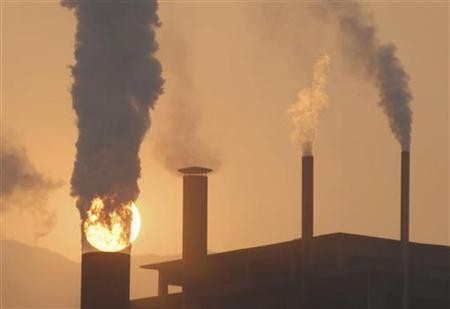
In an alarming report on the increasing risks of climate change that should set sirens off in governments across the world, the United Nations has unequivocally ascertained human influence on the climate system and warned of 'irrevocable' impact of global warming if not curtailed.
The Intergovernmental Panel on Climate Change released the bleak report in Copenhagen on Sunday, in what is said to be the strongest language used by the body on the global issue.
The 175-page report, prepared by about 100 scientists from across the world, has blamed the indiscriminate use of fossil fuels for the climate change, and has said that failure to stop it would lead to acute problems such as food and water crises, loss of ecosystems and mass extinction of plants and animals, severe human ill-health and disrupted livelihoods, coastal and inland flooding, displacement of people and an inhospitable climate under 'periods of extreme heat'.
In a chilling warning, United Nations Secretary-General Ban Ki-moon urged leaders to act immediately stating that "time is not on our side".
"Science has spoken. There is no ambiguity in their message. Leaders must act; time is not on our side," he said.
"Human's influence on the climate system is clear. We must act decisively if we want to avoid increasingly destructive outcomes. The world is largely ill-prepared to address climate risks," Ban Ki-Moon further said.
According to the new report, atmospheric concentrations of greenhouse gases are at levels that are unprecedented in at least 800,000 years.
It also states that each of the last three decades has been successively warmer at the Earth's surface than any preceding decade since 1850. The period from 1983 to 2012 was very likely the warmest 30-year period of the last 800 years in the Northern Hemisphere, the report says.
The report cites that human influence is 'extremely likely' to have been the dominant cause of global warming.
"Human influence has been detected in warming of the atmosphere and the ocean, in changes in the global water cycle, in reductions in snow and ice, and in global mean sea-level rise; and it is extremely likely to have been the dominant cause of the observed warming since the mid-20th century," the report said.
Globally, economic and population growth continue to be the most important drivers of increase in CO2 emissions from fossil fuel combustion.
The IPCC has called for a complete phase out of fossil fuel use by 2100.
IPCC chief Rajendra Pachauri has also warned that India is vulnerable to the effects of climate change and that the government must act on it. The climate change could negatively impact agriculture and affect rural livelihoods as well as have a severe impact on urban life, both of which should concern Indian citizens and authorities.















